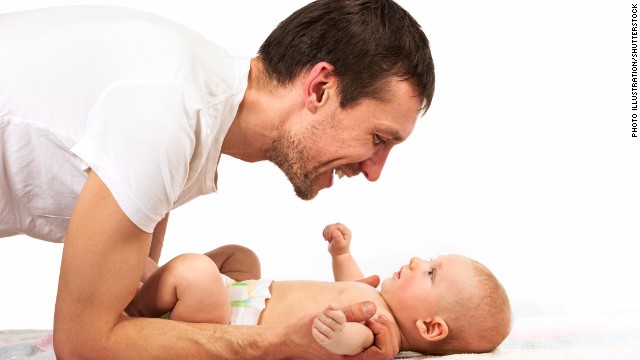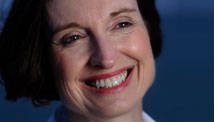- Back to Home »
- Are you ready to be a dad?

- Laura Stepp: Lots of new shows, books and programs on being a good father these days
- That's good, she says, but fewer and fewer American families have a dad at home
- Fathers more likely to walk away when a child was unplanned, she says
- Stepp: Let's emphasize that the best way to be a good dad is to wait till you're ready
Editor's note: Laura Sessions Stepp is senior media fellow at the National Campaign To Prevent Teen and Unplanned Pregnancy and a Pulitzer Prize-winning journalist, formerly with The Washington Post, who specializes in the coverage of young people. She has written two books: "Unhooked: How Young Women Pursue Sex, Delay Love and Lose at Both" and "Our Last Best Shot: Guiding Our Children through Early Adolescence."
(CNN) -- Being a good father is attracting attention these days. Consider: A&E Network plans a new reality show this fall about dads who work at home, called "Modern Dads." The Fox network has ordered a new series co-written by Seth MacFarlane called "Dads." NBC's "Parenthood," which features some dads at home, has been renewed for a fifth season.
Amazon.com carries more than 100,000 books about how to be a father, almost as many as it sells on how to be a mother. Search on Google for "being a good father or dad" and you get about 600 million results.
Government agencies and private organizations spend millions of dollars promoting responsible fatherhood. Even prisons have caught the fever, offering young incarcerated fathers classes on coping with baby tantrums and preparing baby food.

Here's the problem: Despite the hoopla over involved dads, more children than ever live without a father in the home. In 1960, the figure was one out of 10 children. Today it's one out of three.
A new study sponsored by the Guttmacher Institute suggests one reason why. Research shows that four out of every 10 new fathers -- especially younger, less-educated men -- said their babies' births were unintended. And we know from research that those fathers, in particular those who are not married to their children's mothers, are more likely to walk away from the family than fathers whose children were planned.
Could it be that by focusing so much attention on how to be a good father, we have failed to talk enough about when to become a father?
Over the last half-century, fathers have tripled the amount of time they spend with their kids, but that's only about half as much time as mothers spend.
Television studios may be excited about dads who work at home, but in fact such fathers are only 3.4% of parents at home full time.
We consider contraception "a female problem." We discuss the timing of pregnancy and parenting less often with young men than with young women, and even family planning programs haven't been very successful in reaching the guys.
This may help explain why 18- to 29-year-old men, who say it is important to avoid pregnancy "right now," are more than twice as likely as young women to say they would be pleased if they found out that their partner was pregnant, according to a 2010 report by The National Campaign to Prevent Teen and Unplanned Pregnancy. The report said this was true both for men living with their partners and those who were not.
Perhaps some of those men hold on to the tired assumption that fathering a child makes them manlier. Perhaps others are genuinely interested in having a child. What we know for sure, says Kelleen Kaye, co-author of "The Fog Zone," is that if being a parent is harder than men thought it would be, "they can easily leave their partners holding the bag." And many young fathers do that. In fact the proportion of mothers in this country who are single, 36%, is rising, particularly among low-income mothers, and it shows no signs of slowing down.
Fatherhood should begin not with having a baby, but being thoughtful earlier about how one would support a child. Questions about becoming a father are not that different from those for a would-be mother: Are you in a stable, committed relationship? How well do you and your partner know each other? How much do you trust each other? Do you have enough education to secure a good job? If you and/or your partner are employed, do you earn enough to support your family? Are you ready for the lifelong responsibilities of being a parent?
There are other considerations for men who want to be involved fathers that are not so obvious. Stewart Friedman, management professor at the University of Pennsylvania's Wharton School, raised some of them in a recent blog for Harvard Business Review. Men are increasingly interested in "engaging more fully as caregivers and homemakers," he wrote, but gender stereotypes hold them back.
"Men may wonder, what if I'm just not a good dad? What if I'm perceived by my friends as unmanly because I'm doing 'women's work?' What if my children seem me as a poor role model because I'm not the main breadwinner? What if my boss thinks I'm less committed because I'm not at the office as much as the other guys at my level?"
These are all good, important questions to think about before starting a family. Because the best thing you can do to be a good father is to wait until you're ready to be a father.
Follow @CNNOpinion on Twitter .
Join us at Facebook/CNNOpinion .
The opinions expressed in this commentary are solely those of Laura Stepp.







